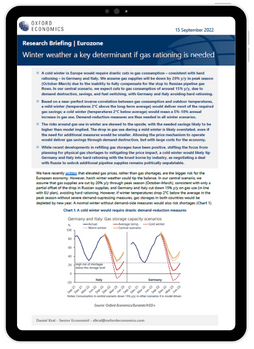Winter weather in Eurozone a key determinant if gas rationing is needed

A cold winter in Europe would require drastic cuts in gas consumption – consistent with hard rationing – in Germany and Italy. We assume gas supplies will be down by 20% y/y in peak season (October-March) due to the inability to fully compensate for the stop to Russian pipeline gas flows. In our central scenario, we expect cuts to gas consumption of around 15% y/y, due to demand destruction, savings, and fuel switching, with Germany and Italy avoiding hard rationing.
What you will learn:
- Based on a near-perfect inverse correlation between gas consumption and outdoor temperatures, a mild winter (temperatures 2°C above the long-term average) would deliver most of the required gas savings; a cold winter (temperatures 2°C below average) would mean a 5%-10% annual increase in gas use.
- The risks around gas use in winter are skewed to the upside, with the needed savings likely to be higher than model implied. The drop in gas use during a mild winter is likely overstated, even if the need for additional measures would be smaller.
- While recent developments in refilling gas storages have been positive, shifting the focus from planning for physical gas shortages to mitigating the price impact, a cold winter would likely tip Germany and Italy into hard rationing with the brunt borne by industry, as negotiating a deal with Russia to unlock additional pipeline supplies remains politically unpalatable.
Tags:
Related Services

Service
European Cities and Regions Service
Regularly updated data and forecasts for 2,000 locations across Europe.
Find Out More
Service
European Macro Service
A complete service to help executives track, analyse and react to macro events and future trends for the European region.
Find Out More
Service
Global Commodity Service
Monthly reports on commodity price trends and forecasts, as well as weekly briefings on the latest price action.
Find Out More